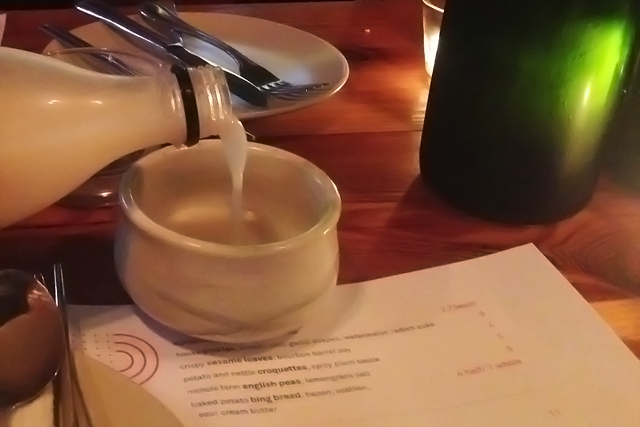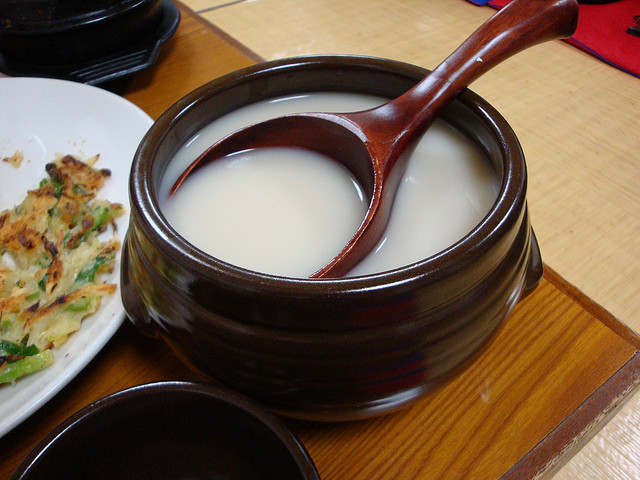Discover This Drink: Makgeolli—It's Alive!
By Melissa McEwen in Food on Jul 24, 2014 8:30PM

Pouring makgeolli at Parachute
It’s delicious, hard for most people to pronounce, and definitely alive. Makgeolli (pronounced mak-gol-li) is a type of Korean unfiltered rice wine. And Parachute Restaurant (3500 N. Elston Ave.) aims to introduce more people to the joys of this unusual brew.
Parachute Sommelier Matty Colston first tried makgeolli at a Korean bar. It was the kind you typically find in the U.S.: heat-treated and sealed. “I liked it, but I didn’t love it” he says. That all changed when he traveled to Seoul, where he first tried fresh makgeolli.
Chicagoans are enormously lucky to have the country’s only makgeolli brewery, Slow City Brewery, right at our doorstep. This allows us to taste the Korean rice wine fresh, with the microorganisms responsible for fermentation still living.
Slow City designed a special bottle so their living makgeolli can breathe properly. If you pick up a bottle at local markets like Joong Boo (3333 N. Kimball Ave.), make sure to keep it upright. Once at home, it continues to ferment in the fridge.
“It’s best when ‘young’” Colston says “it changes a lot as it ferments. The first week it’s sweeter, with fresh banana-like flavors and a mild acidity. I think the sweet spot is is between a week and two weeks.”
“It’s great for pairing” he says “it works well with everything. It’s often paired with pajeon” which is a popular korean pancake usually made with seafood. “We do a version made with pork belly and mung bean, with a puree of kimchi and black garlic, an egg on top, and spicy mustard greens. The spicy food works well with [the makgeolli’s] sweetness, it has carbonation that helps cleanse the palate”
Colston recommends it with any of their spicy dishes, but especially with their hotpot of spicy gulf prawns, blue crab, and dduk (Korean rice cakes). “You’re missing out if you aren’t getting makgeolli with it” he says.
But getting people to try it is a challenge. “We offer it by the carafe” he says “we keep one open for curious people. It’s a weird thing. People do ask about it and we aren’t afraid to give tastes out. It’s natural and loaded with B vitamins. I’m passionate about wine and beer, but there is just something about this product.”
At dinner at Parachute recently I sold my friend on it by describing it as creamy sake crossed with kombucha. And indeed it has much in common with kombucha- both are effervescent and vibrant, though it makgeolli has more alcohol and when served young it is far less acidic.
Slow City prints the brew date on each bottle and places like Joong Boo typically stock a few different brewings, which allows the curious to sample multiple ages.
But you don’t want to wait too long to drink it. Slow City recommends drinking within a month. It gets more and more acidic as it ages. It doesn’t spoil though, it just turns into a fine rice vinegar. So if you neglect a bottle, it’s not a total loss.
At Korean bars like Dancen (5114 N. Lincoln Ave.) it’s served communally in a bowl with drinkers pouring it into their cups with a self-serve ladle. Colston says his father, who is a potter, made the cups they are using now and is working on custom carafes for the restaurant.
A few months ago I tried Great Lakes Brewery’s recreation of ancient Sumerian Beer, a collaboration with University of Chicago archaeologist Tate Paulette. The cloudy bubbly actively-fermented beer they brewed was amazingly similar to makgeolli. And indeed there is something ancient about the drink. You can easily imagine Asia’s first rice farmers at the dawn of the Neolithic imbibing on a similar drink. Whether you are at a traditional Korean restaurant or Parachute, Makgeolli in Chicago means taking advantage of something that’s truly living history.
Discover This Drink is a new series highlighting drinks beyond your everyday cocktail, cider, beer, and wine options.
